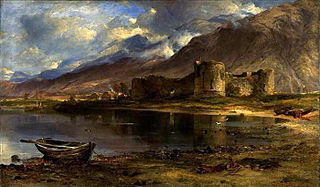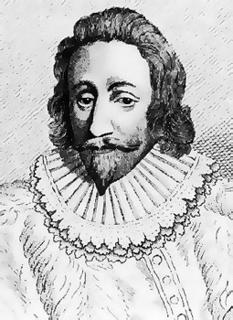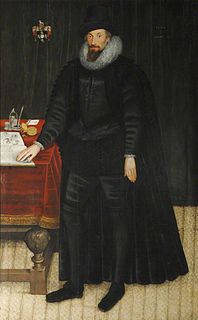
1645 (MDCXLV) was a common year starting on Sunday of the Gregorian calendar and a common year starting on Wednesday of the Julian calendar, the 1645th year of the Common Era (CE) and Anno Domini (AD) designations, the 645th year of the 2nd millennium, the 45th year of the 17th century, and the 6th year of the 1640s decade. As of the start of 1645, the Gregorian calendar was 10 days ahead of the Julian calendar, which remained in localized use until 1923.

Sir Francis Windebank was an English politician who was Secretary of State under Charles I.

Frederick William Pavy was a British physician and physiologist and the discoverer of Pavy's disease, a cyclic or recurrent physiologic albuminuria.
John Blakiston, was a member of the English parliament, one of the regicides of King Charles I of England, a prominent mercer and coal merchant, puritan and anti-Episcopalian.

The Monro of Fyrish family were a Scottish family and branch of the ancient highland Clan Munro. The family produced a notable dynasty of doctors to London in the 18th and 19th century where they were involved in early work on curing 'insanity'. Four generations occupied successively the position of (Principal) Physician of the notorious Bethlem Hospital (Bedlam). They were also leading members of a variety of important medical associations. Other members were painters, priests and philanthropists of note and one was an important early patron to J. M. W. Turner.

Daniel Whistler (1619–1684) was an English physician.

Sir William Paddy (1554–1634) was an English royal physician.
Thomas Turner was an English churchman and academic, Archdeacon of Essex and President of Corpus Christi College, Oxford.
Arthur Dacres (1624–1678) was an English physician and academic, briefly Gresham Professor of Geometry.
Thomas Hoy (1659-1718) was an English physician and poet.
Samuel Gott was an English politician who sat in the House of Commons of England between 1645 and 1648 and between 1660 and 1661.
Thomas Taylor (1775–1848) was an English botanist, bryologist, and mycologist.
Richard Latewar (1560–1601) was an English churchman and academic, known as a neo-Latin poet.
Sir Edward Greaves, 1st Baronet, was an English physician.
William Wagstaffe was a British physician.
Thomas Crosse was an Anglican clergyman, who was Master of St Catharine's College, Cambridge, and Vice-Chancellor of the University of Cambridge.
Benjamin Needler (1620–1682) was an English ejected minister.
John Edwards M.D. was an English academic, headmaster and physician. He was noted as a Royalist supporter in the University of Oxford.

John Thorpe (1682–1750) was an English physician, antiquarian and Fellow of the Royal Society.
The public domain consists of all the creative works to which no exclusive intellectual property rights apply. Those rights may have expired, been forfeited, expressly waived, or may be inapplicable.

The Dictionary of National Biography (DNB) is a standard work of reference on notable figures from British history, published since 1885. The updated Oxford Dictionary of National Biography (ODNB) was published on 23 September 2004 in 60 volumes and online, with 50,113 biographical articles covering 54,922 lives.









